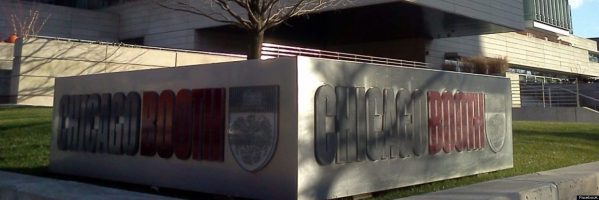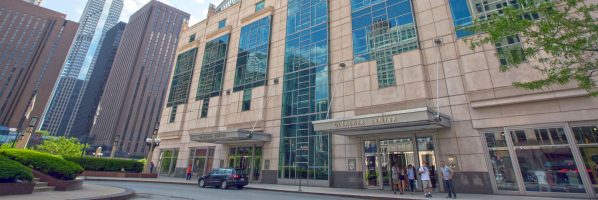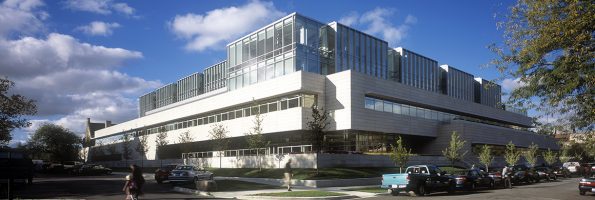Alumni Gift Supports Chicago Booth Svider Private Equity Program

A University of Chicago alum recently gave back to the Booth School of Business in a big way: Raymond Svider, a Managing Partner at international private equity firm BC Partners, presented the school with a $5 million gift, according to a press release. The money will go toward establishing the Svider Private Equity Program at the Polsky Center for Entrepreneurship and Innovation.
While the Polsky Center currently runs a variety of programs in private equity, the gift will help expand what is currently offered to better suit the increased needs and demands of students and alumni for both experiential and academic private equity learning opportunities. These enhancements include:
- Expanded opportunities for students to connect with private equity insiders through additional Entrepreneur-in-Residence positions and programming.
- Enhanced networking and educational opportunities for alumni.
- Broader distribution of Chicago Booth’s thought leadership in the industry.
“Chicago Booth was an ideal complement—both academically and culturally—to my undergraduate engineering background,” Svider said. “An MBA from one of the top programs in the U.S. helped me gain access to the most attractive private equity jobs after graduation—my Booth degree was an ideal stepping stone, an entry ticket to my ideal career.”

Raymond Svider/Photo via Chicago Booth
According to Chicago Booth, the Svider Private Equity Program has three main goals:
- Increase the resources available to students and alumni pursuing private equity careers.
- Strengthen Booth’s private equity alumni community.
- Build Booth’s national and global brand as a hub for private equity education.
“Raymond’s generous gift will allow us to better support our students and alumni in the private equity space across the globe,” said Steven N. Kaplan, Faculty Director of the Polsky Center and Neubauer Family Distinguished Service Professor of Entrepreneurship and Finance at Booth. “The Svider Private Equity Program will greatly expand our ability to offer innovative hands-on and academic learning opportunities to complement the fundamentals of the classroom.”
Getting Your Money’s Worth: The Return on Investment of the Chicago MBA

Although a growing number of business schools throughout the country are offering part-time or Flex MBA programs, many ambitious business students still choose to pursue their education full-time. However, the often high price of tuition combined with two years of lost income can be a huge deterrent in students choosing a full-time MBA program.
Although the thought of taking two years off from a career may be daunting—especially when it comes to a quickly growing city like Chicago—prospective MBAs should also keep in consideration one of the benefits of having an advanced degree: a salary bump. Considering this, students can better evaluate the true return on investment (ROI) program full-time MBA and make smart decisions about where their money will go farthest.
Don’t let the high price tags of MBA programs in a major business city Chicago scare you away. Below are the Chicago business schools that offer students the best ROI.
Kellogg School of Management – Northwestern University
Northwestern University’s Kellogg School of Management boasts one of the highest ROI’s in the world, ranking fourth overall among the world’s best business schools on Forbes recently released list of the best full-time MBA programs in the U.S. Forbes‘ ranking is weighted specifically by how well compensated graduates are several years after earning an MBA.
Forbes ranking notes that 2012 MBA graduates are now making an average of $84,800 in their return on investment. While several business schools will often have a higher-level of compensation for in-state residents because of tuition differences, Kellogg tuition rates remain constant for both in and-out-of-state applicants. On average, students earn around $80,000 per year prior to enrollment, which increased to an astounding average of $196,000 just last year. Most grads pay their entire tuition back less than four years after graduating.
YOU MAY ALSO LIKE: Kellogg Launches 10 New Courses
Booth School of Business – The University of Chicago
In 2016, the Booth School of Business at the University of Chicago topped the ValueWalk list for having the highest return on investment in the world. Comparing the relatively low cost of a Booth MBA (around $65,000-70,000) with graduate salaries of up to $150,000 or more, Booth graduates will have paid for their degree twice over by the time they have completed their first year of work. Booth graduates are also likely to find work quickly—within three months of graduation, 98.4 percent of all MBA graduates had secured job offers. Booth alumni also find many of their post-graduate opportunities through a broad network of alumni and career support at the university. In 2016, the university was responsible for facilitating 75.2 percent of student’s new jobs.
Lake Forest Graduate School of Management
The Leadership MBA at Lake Forest Graduate School of Management current tuition is $55,600 per year. According to PayScale figures, Lake Forest MBA grads earn around $107,000 annually—a difference of over $51,000. Graduates from the LFGSM are spread throughout the globe, living in all 50 states and in 15 countries around the world. Alumni from the MBA program hold positions as CEOs of major companies, elected officials, entrepreneurs, and leaders in a wide variety of industries.
Chicago Booth Professor Richard Thaler Takes Home Nobel Prize in Economics

A professor from the University of Chicago Booth School of Business has won top honors in the field of economics. According to a press release, Richard Thaler was awarded the Sveriges Riksbank Prize in Economic Sciences in Memory of Alfred Nobel 2017. Continue reading…
Chicago Booth Alum Pair Give $75 Million to Their Alma Mater

The University of Chicago Booth School of Business’s coffers just grew—and its top scholars will be called by a new name—thanks to a $75 million alumni gift announced today. In recognition of the gift, students who earn highest academic honors while at Booth will be known as the Amy and Richard F. Wallman Scholars, after donors Amy Wallman, MBA’75, and Richard Wallman, MBA’74. The Wallmans’ gift will be used to support several initiatives, including scholarships for students in the full-time, evening, weekend, and executive MBA programs, as well as enhanced co-curricular programming, faculty research, and emerging priorities.
“We have great affection for the University of Chicago—the Booth School of Business is world class, and we hope our gift makes it even better,” Amy Wallman said in a press release. “The Booth School is very special to us not only because we met there,” Richard Wallman added, “but also because we have sponsored 26 scholarship recipients over the years and are delighted to have had a modest impact on these students’ lives.”
Amy Wallman began a 26-year career at EY after completing her Booth MBA, retiring as an audit partner in 2001. She later served as director at pharmaceutical firm Omnicare from 2004 to 2015. Richard Wallman began his post-MBA career with the Ford Motor Company and went on to serve as chief financial officer and senior vice president of Honeywell International Inc., a diversified industrial technology and manufacturing company, and its predecessor AlliedSignal, from 1995 to 2003. He also held senior financial positions with IBM and Chrysler Corporation.
Dean Madhav Rajan, who took the helm at Chicago Booth this past July, welcomed the generous gift, calling it an “endorsement of Chicago Booth’s enduring strengths, in our programs and our extraordinary faculty.” Continued success rests on maintaining and extending the school’s prominence in research and in developing the world’s next leaders, he added.
“The Wallman Scholars will be recognized as preeminent in this cadre of future leaders, modeling the potential and the spirit of their benefactors,” Rajan said. The permanent designation will be bestowed upon graduating MBA students who earn high honors at Booth. It will also be given retroactively to top alumni, according to the school’s press release.
YOU MIGHT ALSO LIKE: Chicago’s Best 1-Year MBA Programs
The Wallmans, for their part, shared that they were impressed with Rajan’s vision for the school and hope their gift will help advance that vision. “This is a unique opportunity to make a difference in the careers of Chicago Booth students for generations to come and express our gratitude to those who have helped us,” Amy Wallman said in the press release. “Our parents were great role models to both of us; they gave us the confidence that we could accomplish anything.”
Richard Wallman also shared appreciation for the impact working for former Honeywell International Chairman and CEO Larry Bossidy had on his career and his life and thanked friends at Centerbridge Partners and Merrill Lynch, whom he called “key enablers of this gift.”
For more about the Wallmans’ $75 million gift to Chicago Booth, click here.
This article has been edited and republished with permissions from Clear Admit.
How the Chicago Booth School of Business Helps Low-Income Applicants

U.S. News and World Report lists University of Chicago’s Booth School of Business among its top three best business schools in the country. But with the school’s estimated tuition (including living expenses) for the 2017-18 year at $103,759, Booth may not sound like a practical option for a number promising candidates. Though the $126,937 average base salary of graduates is definite proof of return on investment, for many, the cost of tuition may make the idea of earning a Booth MBA seem impossible. Fortunately, the myriad loan and scholarship options available at Booth may make a Booth MBA more feasible for students from all economic backgrounds.
Those of you craving a challenging higher education experience at one of the most prestigious institutions in the U.S. can breathe a sigh of relief. Below, we’ve laid out some of the resources available to help low-income applicants fund their MBA education at Booth School of Business.
Scholarships and Fellowships
Though Booth does not offer need-based financial aid, there are a plethora of merit-based scholarships and fellowships available to promising students. According to the school’s website, awardees are chosen based on the quality of their interview, their academic merit, their prospective concentration, competitiveness, career goals, and life experiences.
Specialized scholarships are available to minority students, veterans, and students with outstanding scholastic achievements. There are also industry-specific opportunities, such as the Canfield Private Equity Fellowship, which is specifically geared toward students with a background in private equity or investment banking, and even includes an internship at a private equity firm.
Take a look at some of the more prominent Booth scholarships available:
Chicago Booth Merit-Based Award
- This general scholarship is awarded to select students at the time of admissions based off, according to the school, “who have excelled in academics, work experience, and service to the community.”
George J. Stigler Fellowship
- This awarded is granted to students who excel in fields such as law, economics, and business.
Forté Foundation Fellowship
- This full-time MBA awarded is gifted to students through the forward-thinking Forté Foundation every year for students that “exhibited exemplary academic, team, community, and/or creative leadership, and are committed to advancing the interests of women in business.”
Distinguished Fellowship
- Students granted this high-ranking fellowship receive a “stipend and mentorship from Harry L. Davis, the Roger L. and Rachel M. Goetz Distinguished Service Professor of Creative Management.” The fellowship covers a student’s entire tuition.
David W. Fox Scholarship
- Another full-tuition award, the David W. Fox Scholarship is gifted to students that have previously or are currently serving in U.S. military. The school notes, “Students must demonstrate outstanding leadership, academic and extracurricular achievements, and a commitment to advancing the interests of those having served in the military.”
You can learn more about Booth’s scholarship opportunities here.
Loans
Booth students who are U.S. citizens or permanent U.S. residents can apply for a variety of federal or private student loans. Students looking for federal loans can choose a Direct Unsubsidized Loan or a Direct Grad PLUS Loan. To qualify for the Direct Unsubsidized Loan, students must be enrolled in at least 200 units each quarter. The maximum amount students can receive with this loan is $20,500 per year. Students who require more than $20,500 per year can apply for the Direct Grad PLUS Loan, which has a much higher cut-off. With this loan, students can receive up to the total cost of attendance (minus any other outside financial support). Students who opt for private, credit-based loans can also borrow up to the total cost of attendance, not including separate sources of financial assistance.
International students also have the option of leaning on loans to help finance their MBA. Booth provides loan options for international students without U.S. cosigners, as these students may not be eligible for private loan options. Those with U.S. cosigners, however, have a wide selection of private loan opportunities available to them.
New Chicago Booth School of Business Research Finds Internal Ethical Bias

New research published from the University of Chicago Booth School of Business is asking whether people chronically believe they are “holier” than others or “less evil” than them. That’s some pretty heavy stuff coming from one of the world’s most prestigious business schools. Continue reading…
